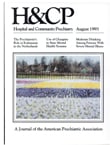Utilization Review of Treatment for Chemical Dependence
Abstract
Utilization review of treatment for chemical dependence has become increasingly important as evidence accumulates that outpatient treatment can be effective in many cases. The authors discuss the basic questions that guide utilization review of treatment for chemical dependence, summarize research that has led to the increasing emphasis on outpatient and partial hospital treatment approaches, and review the American Psychiatric Association's guidelines for utilization review of chemical dependence treatment. Case examples illustrate issues in the treatment of adolescents, patients with dual diagnoses, and relapsing patients. The authors conclude that utilization review supports use of inpatient care only for patients who require intensive services, including those who are a danger to themselves or others, have serious physical or psychiatric disorders, or have not responded to an adequate trial of outpatient treatment.
Access content
To read the fulltext, please use one of the options below to sign in or purchase access.- Personal login
- Institutional Login
- Sign in via OpenAthens
- Register for access
-
Please login/register if you wish to pair your device and check access availability.
Not a subscriber?
PsychiatryOnline subscription options offer access to the DSM-5 library, books, journals, CME, and patient resources. This all-in-one virtual library provides psychiatrists and mental health professionals with key resources for diagnosis, treatment, research, and professional development.
Need more help? PsychiatryOnline Customer Service may be reached by emailing [email protected] or by calling 800-368-5777 (in the U.S.) or 703-907-7322 (outside the U.S.).



